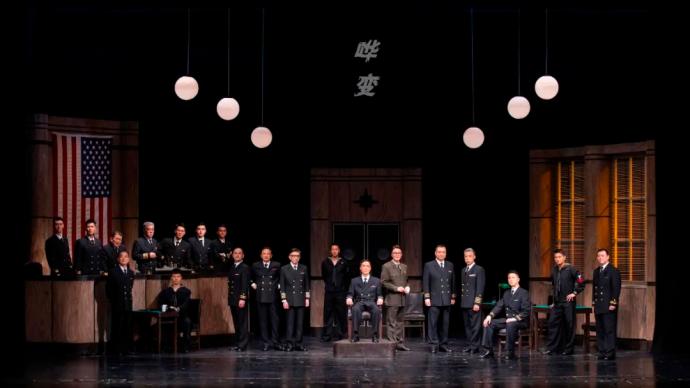
The Chinese premiere of "Mutiny" was still in 1988. It was directed by the well-known American actor and director Charlton Heston, with Ren Ming as the assistant director. Through the superb acting skills of the actors, the whole play made the Chinese audience feel a familiar and unfamiliar World War II situation, and the special setting of the whole play with the court as the stage also made this work a lot of people relish Tao topic.
"Mutiny" is a stage textbook that interprets "the surname of the drama". The whole play takes the military court as the stage. Without the premise of complex action scheduling, it has completely relied on the unique language of different characters to create many flesh-and-blood characters. The image gradually outlines the whole picture of the incident clearly, and at the end of the incident, a reversal is carried out just right - such a "brain-burning" work fully mobilizes the audience's enthusiasm for watching the drama with dramatic elements, and also achieves a Bu Renyi often performs a good stage masterpiece.
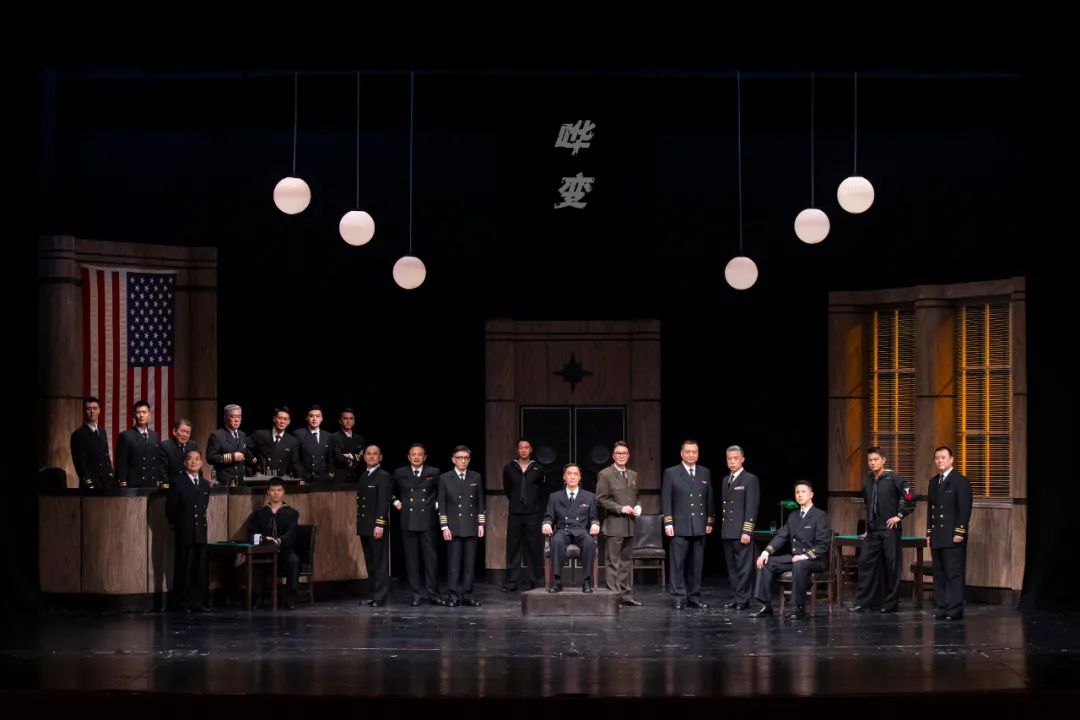
"Mutiny" actor stage group photo by Li Chunguang
"Listening to smart people is a pleasure""Mutiny" is a first-class good show. This play is rather peculiar and has no female characters. It relies on language to show the characters and the connotation of the play. Language does not refer to speaking skills, but to thinking. Digging very deep, it is a style that has never been seen on the stage of Chinese dramas. All the stories in the script are inserted backwards. Characters, events, backgrounds, and conflicts are all told by the lines, and there is only one scene on the stage - the court, There are no tricks to lighting and effects, just need to see the actors' real skills. Most of the people on the stage are sitting in fixed places, and they are all wearing uniforms of the same color. They rely on language to reveal the thoughts and characters of the characters. It is difficult. Interestingly, the protagonist does not have the most lines. The protagonist only goes on and off the stage twice, and the audience has to clearly see that he is the protagonist. In short, we hope to enrich the means of expression on the stage of our drama through this play , but also to gain some insight.”
Ying Ruocheng, a late performing artist and translator, and former vice minister of the Ministry of Culture, wrote on the play display board in the Capital Theater to commemorate the 70th anniversary of Beijing People's Art.
With the advent of the oriental wind of reform and opening up, Beijing Renyi staged "Invitation to the Urn" (1980), "Death of a Salesman" (1983), "God's Beloved" (1986) and this one in succession in the 1980s. "Mutiny" (1988) - Ying Ruocheng, who is the driving force behind the successful launch of these Western dramas, has all contributed greatly. With the free switch between Chinese and English, and even between Eastern and Western cultures, he not only fails to translate scripts, but also directs and acts with exquisite and beautiful scenery.
In May 2021, the five-episode character documentary "Ying Ruocheng" produced by Beijing Renyi in three years will be shared with the majority of drama lovers in the form of free broadcast. In the third episode of the series, along with the retrospective of historical images, the narration said: "In 1988, Ying Ruocheng, who had been the vice minister of the Ministry of Culture for two years, took time out of her busy schedule to bring the American writer Herman Walker's work to her. The play "The Caine Mutiny" was translated into Chinese, and the famous American watch director artist and Oscar winner Charlton Helton was personally invited to Beijing Renyi to direct the play."
"Mutiny" is a real "talk" drama, and the preparatory work of that year did not dare to neglect at all. In July and September 1988, the crew was invited by Ms. Bowie, the wife of the US ambassador to China, to the US embassy in China to watch the American film "Mutiny" (starring Humphrey Bogart), and asked the embassy attaché to give lectures on the film. The knowledge and military actions of the US Navy; on August 30, 1988, the crew received 14 old US Navy uniforms from the US Embassy (a total of 14 actors appeared on the stage of the play), which became the performance costumes during the performance. According to the relevant historical materials of Beijing Renyi, the key props in the play, the model of the Kane warship, was also presented by the US embassy.
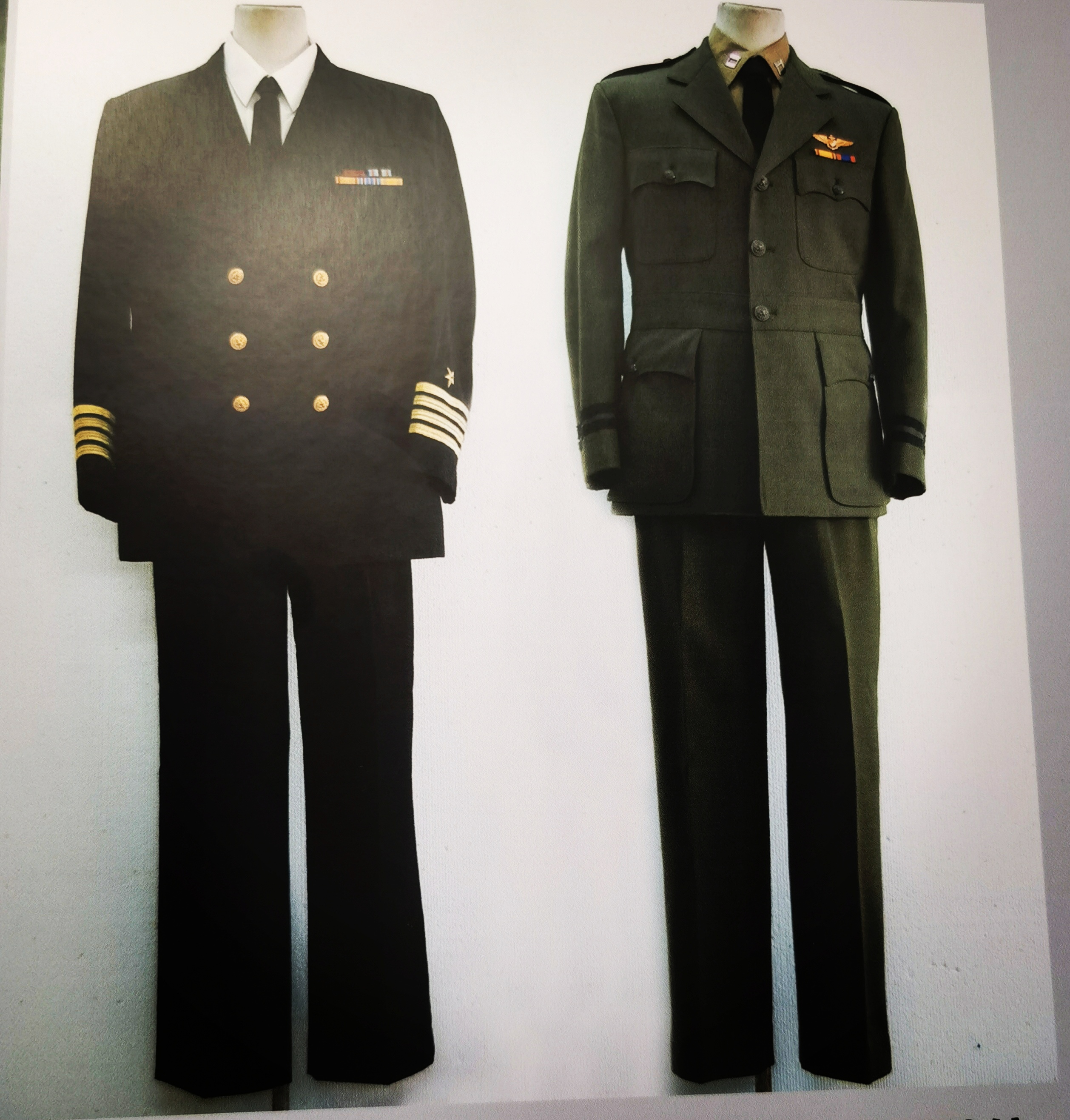
Before the performance in 1988, the US embassy provided military uniforms, reprinted from the Beijing People's Art Information Board Photo by Wang Zheng, a reporter from The Paper
If the skin does not exist, the hair will be attached. At that time, the performance of "Mutiny" was an unprecedented success. Even today, the 7-and-a-half-minute monologue played by Master Zhu Xu is still regarded as a classic by the world. Behind the superb performance of the actors is Ying Ruocheng's brilliant work of giving full play to his subjectivity in the process of script translation and introduction. According to statistics, there are 32 Chinese idioms in the prosecution scene in the first act of the whole play (repeated occurrences are not counted in the statistics). ).After watching the play, Wang Xiaoying, a well-known director of the National Theatre, published a play review under the title of the line in the play "Listening to smart people is a pleasure". The opening chapter wrote: Just when we were arguing about whether the drama should be named "Hua", and trying to use "symbolic language" and even "body language" in some stage practices, an authentic surname appeared in the slash. The "words" come, the whole "Mutiny" is completely "said", and you have to admit that it has a unique charm.
The drama critic Tong Daoming pointed out that the success of "Mutiny" will be a timely reminder to Chinese dramatists: the artistic innovation of drama can not only break the dominance of lines, but also endow drama art with more physical modeling factors; It is also possible to take the path of improving the potential of drama lines, that is, to dig deep into the inherent territory of traditional drama, and to develop new artistic possibilities of drama while exerting the charm of language.
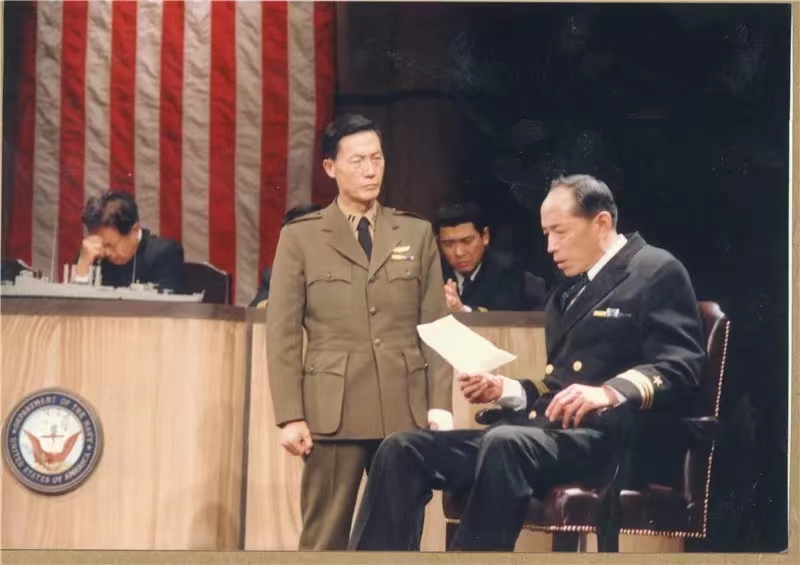
"Mutiny" premiered in theaters in 1988, with Zhu Xu (right) as Captain Quig and Ren Baoxian (left) as lawyer Greenwood
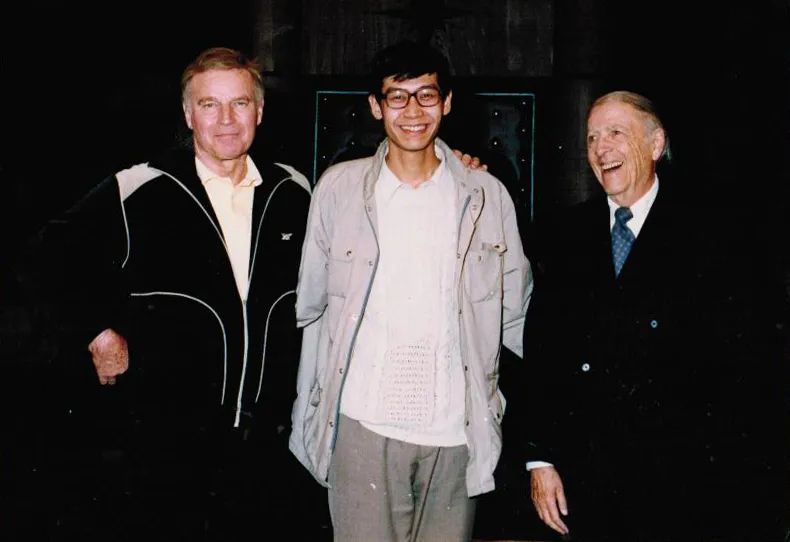
Ren Ming and "Mutiny" author Herman Walker (right), director Charlton Heston (left) The picture comes from the official public account of Beijing Renyi
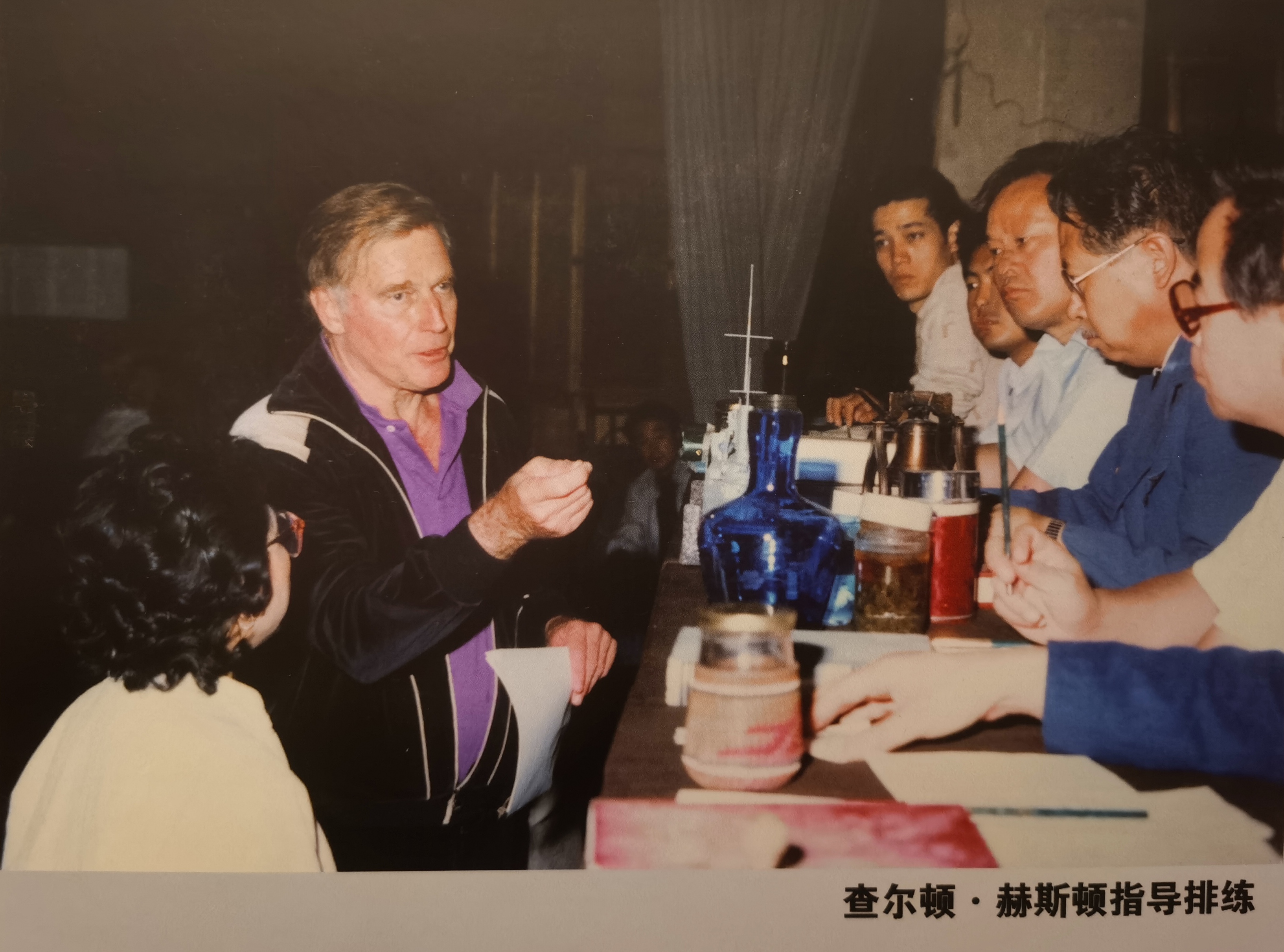
Charlton Heston directed the rehearsal of "Mutiny", a remake from the Beijing People's Art Information Board Photo by Wang Zhen, a reporter from The Paper
"The director's seat is always empty, and the director's bell and script are also there..."The documentary "Ying Ruocheng" specifically mentioned, "In 1988, the Chinese deputy director Ren Ming, who was an assistant to the American director Charlton Heston, learned a lot of creative experience from the senior artist Ying Ruocheng." Mr.'s script is very local to Chinese culture. Chinese audiences can enjoy the play according to their own play-watching habits. The actors also find it very enjoyable and comfortable to act, and they perform very freely. Because the lines are very smooth , very flavorful." Ren Ming recalled.
In 2006, "Mutiny" was revamped, and Beijing Renyi Mesozoic actors took over collectively. Since then, he has appeared on the stage of the Capital Theater four times in 2007, 2009, 2012 and 2018. It is particularly worth mentioning that in June this year, during the 70th anniversary of the founding of Beijing Renyi Academy, the play was also broadcast live on the entire network as the "classic play broadcast and guided tour" of the commemorative event. In "Tribute to Drama - Online Commemorative Performance of the 70th Anniversary of the Founding of Beijing People's Art Institute", "Mutiny" (fragment performance) was brought by the "Five Tigers of People's Art" Feng Yuanzheng, Wu Gang, Ding Zhicheng, Wang Gang, Gao Dongping to bring wonderful courtrooms Fighting for the front, showing the audience the strength of the drama lines and the charm of the language.
On June 19, in the joyous atmosphere of the 70th anniversary of the academy, Beijing People's Art Theater President Ren Ming died suddenly of a heart attack. From the recent performance arrangements of Beijing Renyi, I don't know if it is a coincidence or intentional, "Ruan Lingyu", "Mutiny", "The Death of a Famous" and "Relationship" are all works by Ren Ming's past directors (or participating directors). It is also worth mentioning that during this round of performances, the attentive theater staff turned the "Ren Ming Drama Collection" displayed in the exhibition cabinet outside the theater, from the previous work "Ruan Lingyu" to the chapter "Mutiny", for the audience to observe and experience the director's work. idea. From this, it is not difficult to see that "Mutiny" is the second work that the young Ren Ming participated in and directed after he came to Renyi.
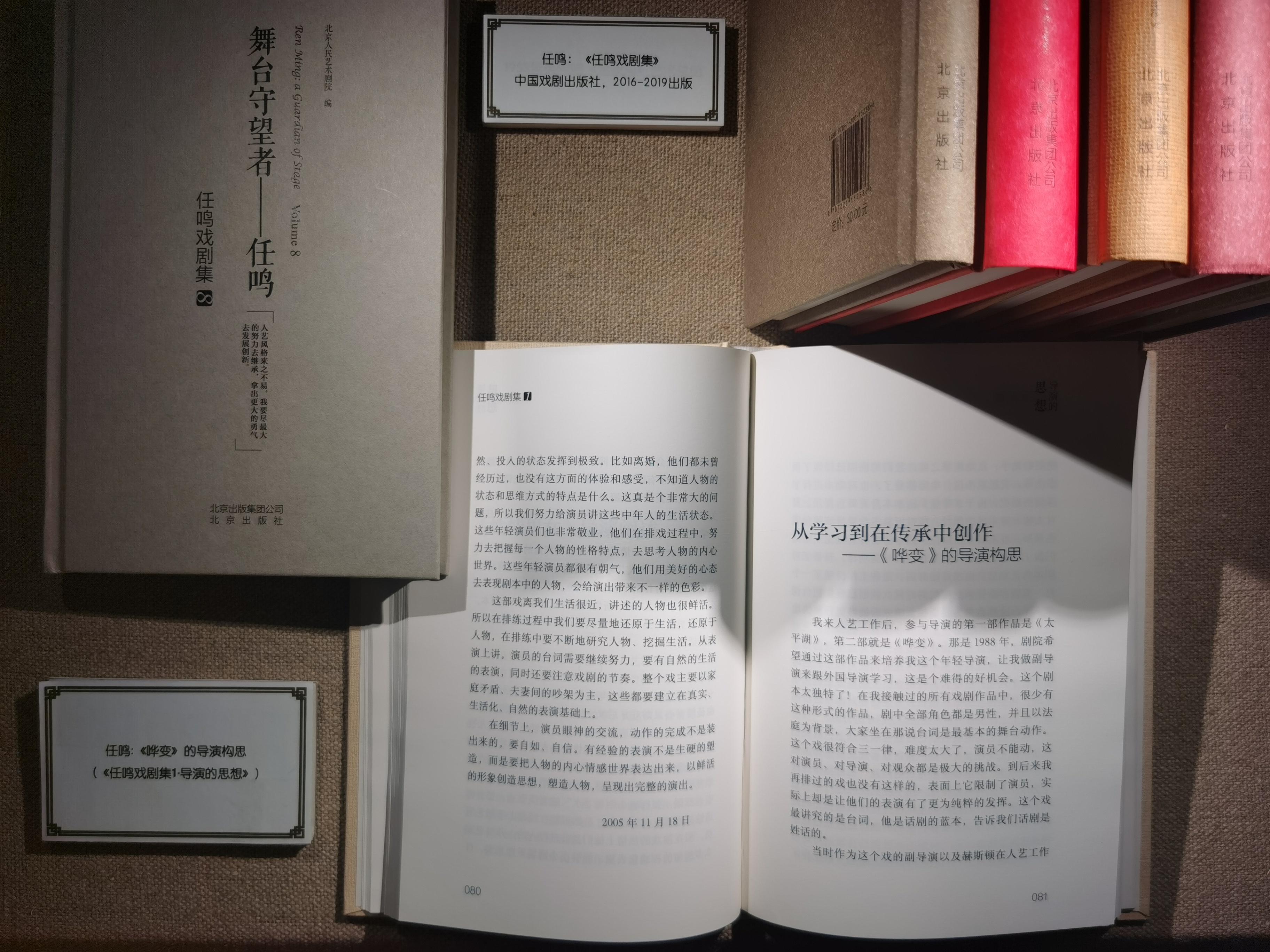
The director of Ren Ming's "Mutiny" conceived by the surging news reporter Wang Zhen
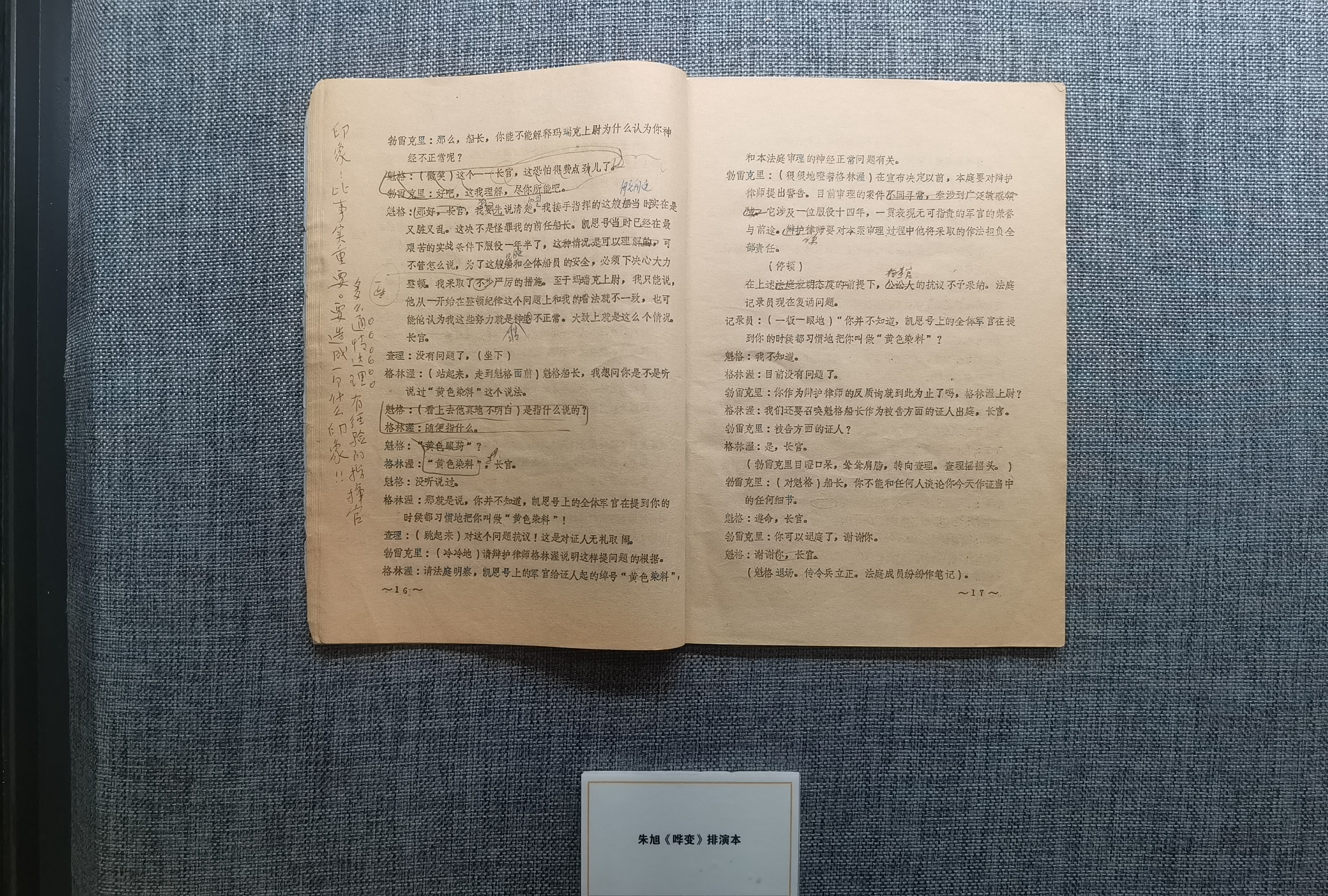
Zhu Xu's "Mutiny" rehearsal photo by The Paper reporter Wang Zhen
"In the rehearsal hall, we have always left the director's seat empty, and the director's bell and script are also there, as if he is still there." In the revival version of "Mutiny", he took over Zhu Xu and played the role of Captain Quig. Chang Feng Yuanzheng said in an interview with The Paper."When we took over Tea House (1999), we had to endure five or six years of 'bricks' from the audience before we gradually accepted this group of actors. Now the audience is more tolerant towards young actors." Feng Yuanzheng said with emotion, "All the stage actions in this play It's all in the heart, except for the language action, it's the inner action, you have to sit so that the audience can see it clearly. "Mutiny" is a play with unique charm in terms of lines and performance." In his view, the play The handling of the lines in the middle is a challenge for the actors, and the interlocking of the lines also complements the court theme of the play, making the whole play exciting and rigorous at the same time, making "Mutiny" have a higher level of artistry.
Acting in "Mutiny" on the occasion of the 70th anniversary of the hospital undoubtedly proves that this work also has a special commemorative value for Renyi. Feng Yuanzheng believes that, on the one hand, "Mutiny" represents the unique style of Beijing Renyi's performance in foreign plays, and represents the theater's unique localized second creative concept. of strong historical significance. "Salute to our predecessors and everyone is the greatest significance of appearing in "Mutiny"."
Speaking of which, Wu Gang played the deputy captain Marek in the 1988 version of "Mutiny". He said that starring in this work requires a thorough understanding of the script, a deep understanding of the logic of the story and the background of the characters, in order to perform a successful interpretation, "From the perspective of an actor himself, the role of Greenwald can hone the actor and train the actor. Woo is in control of the rhythm of the whole play, and it's a rare opportunity for an actor."
Speaking of Director Ren Ming, Wu Gang also slightly reddened his eyes. "Our '85th class' brothers naturally have a friendship in it, and we have been looking for an opportunity to act together. "Mutiny" is a good opportunity. Director Ren Ming has devoted more than 30 years to the rehearsal of this play. With a lot of hard work, I believe he will keep watching us from the sky." Wu Gang told The Paper reporter that the lines of the whole "Mutiny" are dense and logical, "The third act is the finishing touch - this big reversal, the audience It might be surprising if you didn't focus on the plot from the first line of the first act."
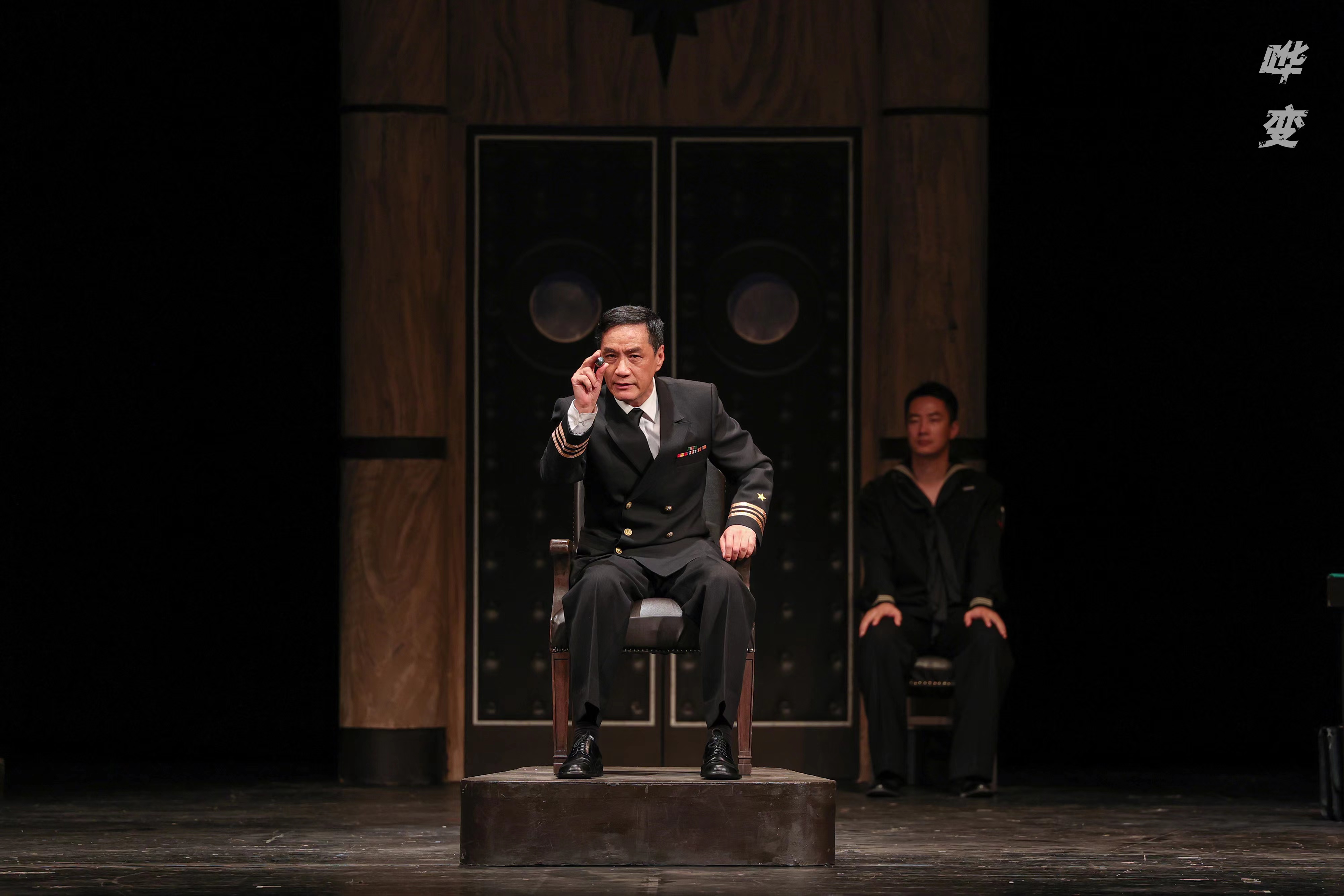
Stills of "Mutiny", Feng Yuanzheng as Captain Queig Li Chunguang
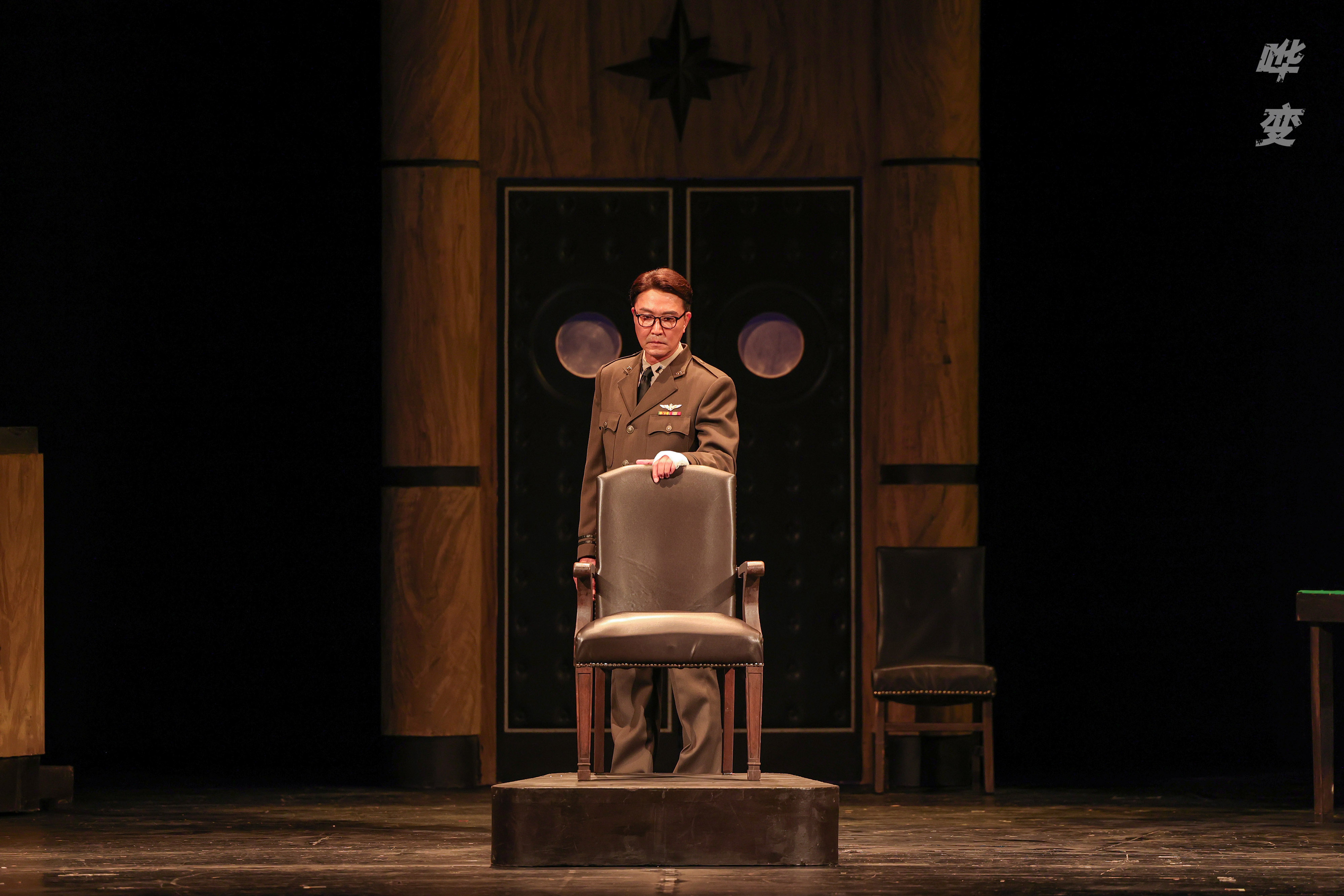
"Mutiny" stills, Wu Gang as lawyer Greenwood Li Chunguang
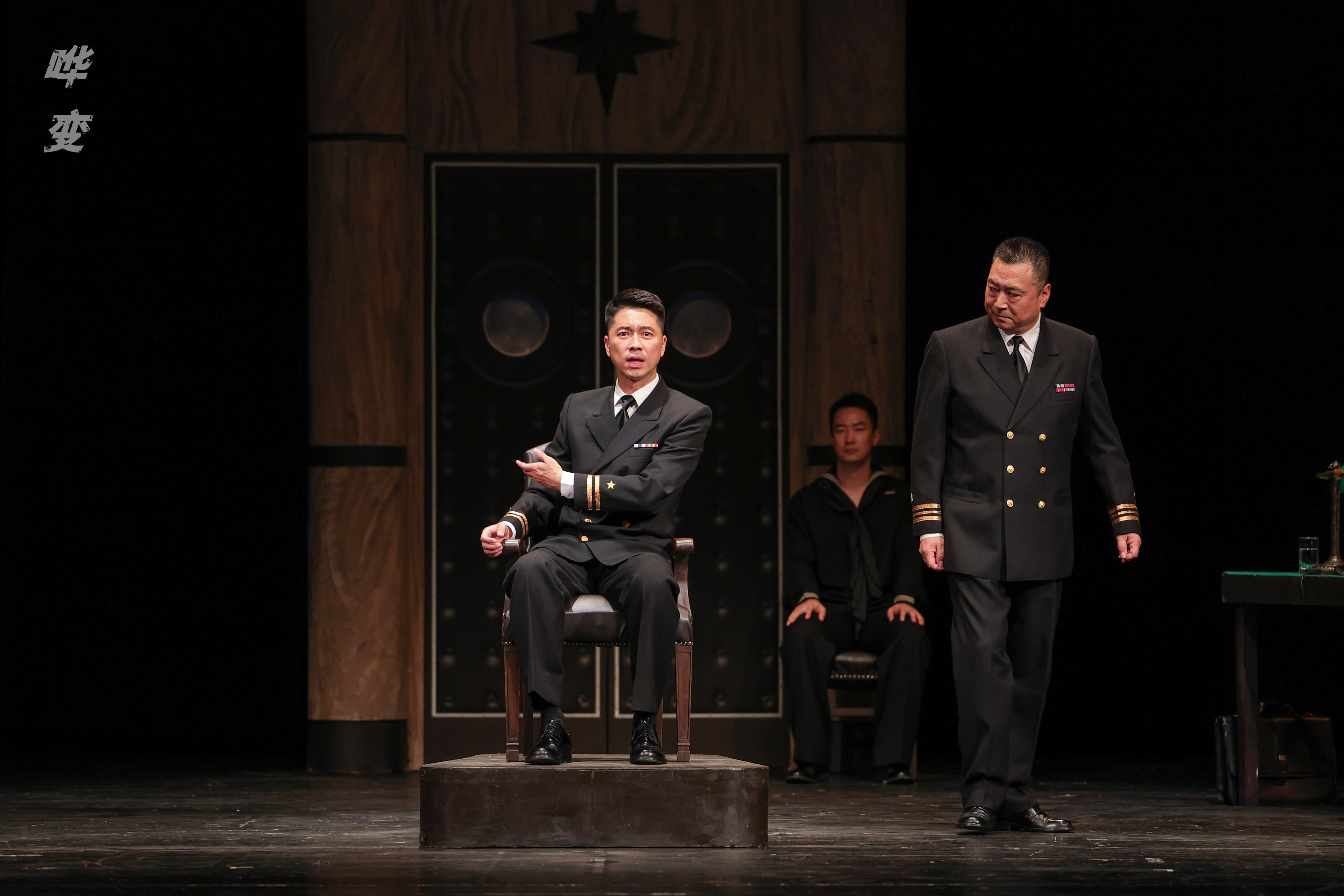
"Mutiny" stills, Wang Lei (middle) as Marek, Wang Gang (right) as Charlie Li Chunguang
From the first edition performance in 1988 to the rescheduled performance in 2006, for Beijing Renyi, "Mutiny" undoubtedly has the meaning of inheritance. Young actors who once enjoyed their predecessors' performances under the stage took to the stage. In today's performances, there are Feng Yuanzheng, Wu Gang, Wang Gang, Zhang Fuyuan, Cong Cong, Zhang Wankun, Gao Dongping, Ding Zhicheng and other talented actors and actresses. Lei, He Jing, Zou Jian, Xu Baixiao and other artistic backbones participated in the performance."At the age of 40-year-old actors, we really have to take responsibility and face the inheritance and succession of many classic plays. So I hope that every time we appear on the stage, we can show the audience who loves people and art. When it comes to hope and seeing the future, both the old audience and the fans of Renyi can still enjoy the happiness that Renyi brings to them." Wang Lei, who plays Marek in this play I have been playing this role since I was 23 years old. While I have a deeper understanding of the play, I also feel the responsibility of being a young actor of Renyi. "I have to compete with my seniors in a better state. Start the boat Mutiny together, learn from them, and keep up with them,"
"When the revival of "Mutiny" in 2006, I had just entered the theater for two years - Director Ren Ming was my mentor, he recruited me into the talent show, and it was he who allowed me, a young man, to be able to live in such a young age. At that time, he played the role of Mutiny." Wang Lei recalled, "At the founding meeting of that year, Director Ren Ming's first sentence was, 'There is no attitude problem in this play, only a level problem.' We all understand that "Mutiny" "shows the collective strength of Renyi actors. At that time, everyone rehearsed until eight o'clock every night, and then I would practice for another two hours by myself. At ten o'clock, I turned off the lights in the rehearsal hall alone and left... That part The day was unforgettable."
"The veteran actors of Renyi mark and write their experiences on the script, just like reviewing musical scores. Everyone has their own characteristics, which shows their own appreciation and understanding of the script." Wang Lei said that many old actors will take Rehearse with the original script. "This play, our group of actors in 2006 has also performed for 18 years, but the mentality can be reset to zero, and the accumulation cannot be reset to zero."
"This rehearsal is also our collective farewell to him (Ren Ming). Especially in the rehearsal hall, I was the first to come on stage and say my lines. This line is very simple, but I find it very difficult to say, watching the director's seat empty. Position, a few times the words are on the lips, but we can't open our mouths... But we can't be immersed in grief all the time, gritted our teeth and adjusted to face the audience in the best state." In Wang Lei's view, "Mutiny" The amount of lines is huge, the stage scheduling is very small, and the actors are basically in the middle and back of the stage. It can be said that it is the best whetstone for an actor.
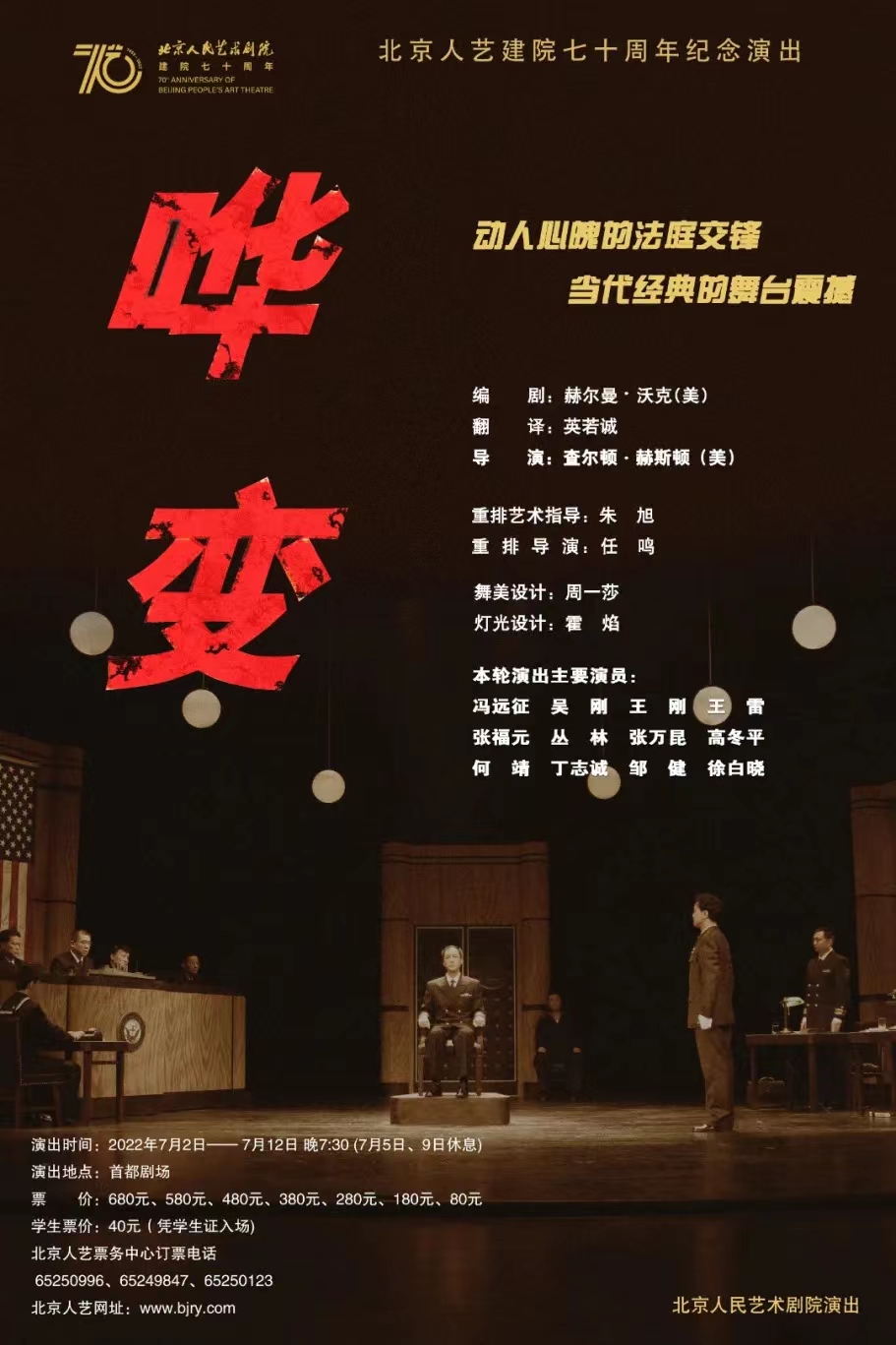
performance poster